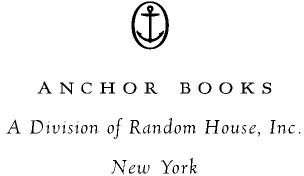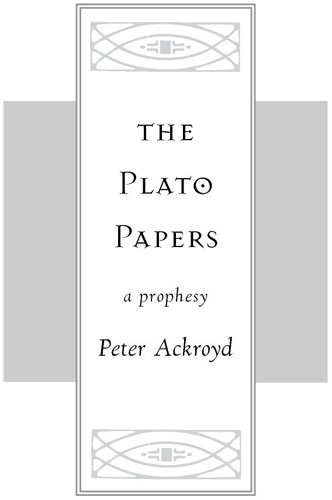The Plato Papers




Table of Contents
The Lectures and Remarks of Plato on the Condition of Past Ages
The Journey of Plato to the Underworld
The Trial of Plato Charged with Corrupting the Young by Spinning Lies and Fables
For Elizabeth Wyndham
I often envisage, in this new age of universal and instantaneous communication, how our planet might appear to distant observers. It must seem to shimmer in a state of continual excited activity, rather like a round diamond in the sky.
Ronald Corvo,
A New Theory of the Earth,
2030.
All fallen dark and quiet, all gone down. Collapsophe.
Joseph P., Diaries, 2299.
We who survive, we scoured ones, in depths of dark dismay, call out of the night of our world, gone as we knew it, as we know it.
London hymn,
c.
2302.
Slivers of light. Silvers. Little horn-shaped lights, riding the waves of darkness.
Joseph P., Diaries, 2304.
Myander, a Londoner, wrote the history of a changing world, beginning at the moment of transition, believing that it would mark a great epoch, one more worthy of relation than any that had come before. This belief was not without its grounds. The world of science had collapsed, but the divine consciousness of humanity had not yet asserted itself. All the labours of Myander lay in recording the manifest signs of dismay and wonder. Since the events of distant antiquity, even those immediately preceding the great change, cannot clearly be understood she believed it her duty to enquire carefully into immediate circumstances.
Myander,
History,
2310.
The holy city, restored. Ourselves, revived.
Proclamation, 2350.
The components of the light have been carefully studied. In addition to manifold influences on the human plane, such as will and desire, there are tokens of power from the earth itself. The smallest territory can exert its influence, moving those who come within its boundaries. This city, for example, is not indifferent to the joys or sufferings of its inhabitants.
The London Intelligencer,
2998.
I cannot pretend to have been present during the glorious restoration of human light, the greatest and perhaps most significant scene in the narrative of humankind. Yet I believe that I am blessed in another sense, living on the verge of a new age. All around me I am beginning to see greatness and munificence erected, while our citizens with wonderful zeal have tried to revive and emulate the labours of distant antiquity. When asked why they are engaged in this pursuit, they reply ‘Why not? What else is there to do?’ This is our new spirit!
Letter from Popcorn to Mellitus, 3399.
The city bears us. The city loves its burden. Nurture it in return. Do not leave its bounds.
Proclamation, 3506.
In returning to the origin of all things, we meet our destiny. Do you see our doubles, passing by us weeping? This is the nature of our world.
Proverbs of Restituta, guardian of London, 3640.
It is sometimes considered wayward or importunate to paint a portrait of one man, yet we know from the pictures of parishioners lit upon the Wall of our great and glorious city that a single feature or glance may embody a fateful moment or an eventful transaction. So I intend to conjure up a likeness of Plato, the great orator of London, in a similar fashion. I will practise the art of selection; like the displays of our actors continually before us, some events will be presented on a grand scale and others diminished. The conventions of spherical drama will be preserved from the beginning to the end; the revelations and lamentations, for example, will be in strict keeping with each other. By these means we may see his unhappily brief life as a continual search after truth. But it will also be my duty faithfully to record Plato’s final days in the city and to ascertain how a cruel superstition excercised boundless dominion over the most elevated and benevolent mind.
Anon.,
The Plato Papers,
3705.
ACCLAIM FOR Peter Ackroyd’s THE PLATO PAPERS
“Peter Ackroyd is a visionary, as
The Plato Papers
makes clear. This is one of the oddest but most important novels to appear in many years. This masterpiece of contemporary writing will thrill and entertain readers for years to come, but it will do more than that: it will enlarge their vision, stimulating organs long forgotten and never known.”
—Jay Parini, author of
The Last Station
and
Robert Frost: A Life
“[
The Plato Papers
] makes an easy introduction to an author who, like Plato, questions the century’s most treasured assumptions. Insidiously, he persuades readers to doubt them, too.”
—San Francisco Chronicle
“A work that manages to be at once metaphysical romp, vaudeville routine, survey of human history, and satire on contemporary society and smug academics.”
—The Seattle Times
“What makes [
The Plato Papers
] notable is not its fantastic invention but its intelligence. . . . Excellently written . . . with a truly Socratic curiosity, making
The Plato Papers
a philosophical good read.”
—Malcolm Bradbury,
Financial Times
“Ackroyd is such a wonderful writer, his sentences pop with wit and weight. This newest book is intellectual
and
entertaining, no small accomplishment.”
—
The Commercial Appeal
(Memphis)
“[A] rollicking and merry paean to the redemptive properties of ignorance. . . . Hilarious and wonderful.”
—The Buffalo News
“This is a marvelous fable for our times. It is funny, wise, and strange. . . . In the eighteenth century, Dean Swift cast a scorching searchlight on his own times by isolating their follies in imagined lands to which Gulliver made his imaginary travels. Ackroyd has pulled off a similar feat of travel in time and imagination.”
—A. N. Wilson,
Daily Mail
“
The Plato Papers
is likely to challenge readers for generations to come.”
—The Christian Science Monitor
“An invigorating meditation on the changelessness, after no matter how many eons, of human nature and its uneasiness with the unfamiliar.”
—Time
“
The Plato Papers
is a little book that raises some big questions. . . . You can finish the book in a couple of hours. But if you read it carefully, you’ll go on thinking about it for days.”
—The Philadelphia Inquirer
“Imaginative, witty, incisive fiction.”
—Richmond Times-Dispatch
“Erudite and highly original . . . Peter Ackroyd combines Swiftian social satire with philosophical wisdom to illustrate the symbiotic and confusing relationships between fiction, history and philosophy.”
—The Tennessean
“It is like T. S. Eliot on speed meets Martian poetry but with better jokes.”
—The Times (London)
c.
3500 BC–
c.
300 BC: The Age of Orpheus
c.
300 BC–
c.
AD 1500: The Age of the Apostles
c.
AD 1500–
c.
AD 2300: The Age of Mouldwarp
c.
AD 2300–
c.
AD 3400: The Age of Witspell
c.
AD 3700: The Present
The Lectures
and Remarks
of Plato on the
Condition of
Past Ages

1
Sparkler:
Wait, Sidonia, wait!
Sidonia:
Gladly.
Sparkler:
I just saw you in the market. You were standing beneath the city wall, and so I assumed that you were listening to Plato’s oration.
Sidonia:
Correct in every respect, Sparkler. But I expected to see you there, since you always celebrate the feast of Gog.
Sparkler:
I was about to cross the Fleet, and join you, when Madrigal stopped me.
Sidonia:
What did he want?
Sparkler:
Only something about a parish meeting. But, as a result, I missed Plato’s opening remarks. I heard only his ending, when he spoke of his sorrow at the darkness of past ages.
Sidonia:
It was all very interesting. There was a period when our ancestors believed that they inhabited a world which revolved around a sun.
Sparkler:
Can it be true?
Sidonia:
Oh yes. They had been told that they lived upon a spherical planet, moving through some kind of infinite space.
Sparkler:
No!
Sidonia:
That was their delusion. But it was the Age of Mouldwarp. According to Plato, the whole earth seemed to have been reduced and rolled into a ball until it was small enough to fit their theories.
Sparkler:
But surely they must have known—or felt?
Sidonia:
They could not have known. For them the sun was a very powerful god. Of course we were all silent for a moment, after Plato had told us this, and then he laughed.
Sparkler:
He laughed?
Sidonia:
Even when he had taken off the orator’s mask, he was still smiling. Then he began to question us. ‘Do you consider me to be small? I know that you do. Could you imagine the people of Mouldwarp to be much, much smaller? Their heads were tiny, and their eyes like pinpoints. Do you know,’ he said, ‘that in the end they believed themselves to be covered by a great net or web?’
Sparkler:
Impossible. I never know when Plato is telling the truth.
Sidonia:
That is what he enjoys. The game. That is why he is an orator.
Sparkler:
We who have known him since childhood—
Sidonia:
—never cease to wonder.
Sparkler:
But who could be convinced by such wild speculations?
Sidonia:
Come and decide for yourself. Walk with me to the white chapel, where he is about to begin his second oration.